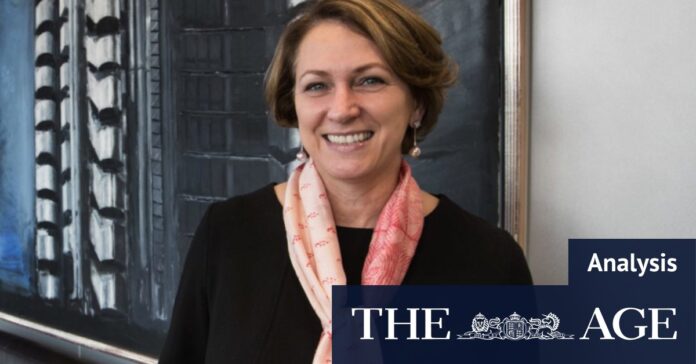[ad_1]
“I didn’t particularly feel that when I was chief executive that I was held to a different standard, but sometimes there were criticisms saying that I needed to behave more like a man,” she says.
“When you get to be the chief executive, if you have a different style that is not necessarily well understood or appreciated by others, they may expect you to perhaps behave in what is seen as a more traditional way.”
Women have on average lasted 5.2 years as chief executives compared with 8.1 years for men since 2018.
The media can play a big role in elevating the profiles of female chief executives, says Beale, although she sought to block out any “noise”.
“I tended to ignore the media because I didn’t want to get distracted from my job and it was my coping mechanism,” she says.
Jemima Olchawski, chief executive of the Fawcett Society which campaigns for equality, says that even women who are earning 10 or 20 times the average salary still come up against gender barriers.
“You might be a hotshot running a FTSE 100 company and getting paid a fortune,” she says.

Susan Wojcicki, a prominent advocate for workplace equality, spent nine years at the helm of YouTube.Credit: Bloomberg
“But that doesn’t mean people aren’t expecting you to organise play days or care for a sick relative, or suddenly turn up to collect a kid from school if they are feeling unwell.”
Childcare duties and caring for elderly parents are still overwhelmingly seen as a woman’s responsibility, she says.
“It’s so embedded that it isn’t about rational choices as to who’s got the most time or whose time in economic terms is the most expensive,” says Olchawski. “It’s about what the expectation is or who is perceived as appropriate and competent to do those roles.”
Problems are being compounded by the fact that many employers have not adapted to the kind of flexibility needed to help women succeed, Olchawski adds. “We still have working practices that are kind of stuck in the 1950s,” she says.
The challenges around childcare are echoed by Shevaun Haviland, director general of the British Chambers of Commerce (BCC). “Clearly, there’s still a huge challenge,” she says.
“Research for the BCC in March last year showed two-thirds of women felt they’d missed out on career progression because of childcare responsibilities.”
Olchawski adds that women are also judged more harshly for their performance regardless of seniority.
“We know that women are appraised more negatively than men for objectively the same performances,” she says. “So that’s rooted in some really powerful ideas about gender norms – about how women should behave.”
Women have on average lasted 5.2 years as chief executives compared with 8.1 years for men since 2018, according to an analysis of 12 stock markets – including the FTSE 100. Studies looking more widely at women in leadership roles have found similar patterns.
For example, female MPs tend to stay in their jobs for shorter periods than their male counterparts.
“A theme that came up was that it’s such a high-pressured environment that perhaps it’s not something that you can maintain for very long, particularly when you’re balancing responsibilities,” Olchawski says.
She adds that for those with children, often it is only possible “because they have a partner who is prepared to support them wholeheartedly”.
“And there may be a limit to the amount of time that it’s reasonable to ask their partner to make those kinds of sacrifices,” she says.
Loading
Morrissey also highlights that work cannot always come before family. “Women want to achieve more than just financial results,” she says.
“When I was chief executive of Newton, I didn’t want to delegate everything to do with my children.
“We had a nanny and my husband was at home since we had the fourth child so I was very lucky compared with most women. But I still didn’t want to just see my children at the weekend. I wanted to be an active parent.”
Beale says such deliberations are common among the women she has met in the City. “When you become a chief executive, your time is rarely your own,” she says. “It’s really tough to get that balance right.”
When she decided to step down after five years at the helm of Lloyd’s, Beale had many other things she was looking forward to. “I felt I needed five years to achieve what I wanted to achieve,” she says. “And then I thought it was time for someone else to take over.”
This perhaps reflects a broader sense of how women are more likely than men to hand over control when they feel the time is right.
“I believe there have been studies into how females think of power and how it means different things to them and it doesn’t always mean just staying in that top job,” says Beale. “I think there is a difference between the genders in that regard.”
There is no silver bullet for solving the problem of female representation in the City but Morrissey believes that employers adopting a more flexible approach is key.
“We’ve still got some way to go to modernise working practices,” she says. “I don’t think a chief executive should be working 80-100 hours a week because they’re not going to make great judgments.
“But that’s often still the way it works and that’s not good for anybody, man or woman.”
The Telegraph, London
Expert tips on how to save, invest and make the most of your money delivered to your inbox every Sunday. Sign up for our Real Money newsletter.
[ad_2]
Source link


